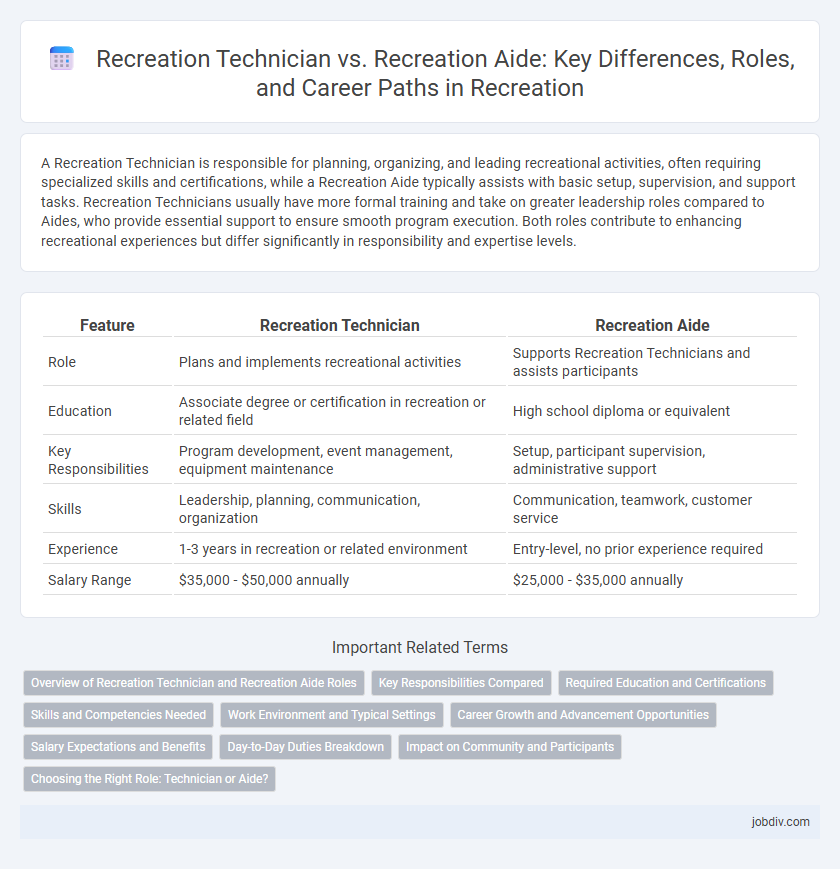A Recreation Technician is responsible for planning, organizing, and leading recreational activities, often requiring specialized skills and certifications, while a Recreation Aide typically assists with basic setup, supervision, and support tasks. Recreation Technicians usually have more formal training and take on greater leadership roles compared to Aides, who provide essential support to ensure smooth program execution. Both roles contribute to enhancing recreational experiences but differ significantly in responsibility and expertise levels.
Table of Comparison
| Feature | Recreation Technician | Recreation Aide |
|---|---|---|
| Role | Plans and implements recreational activities | Supports Recreation Technicians and assists participants |
| Education | Associate degree or certification in recreation or related field | High school diploma or equivalent |
| Key Responsibilities | Program development, event management, equipment maintenance | Setup, participant supervision, administrative support |
| Skills | Leadership, planning, communication, organization | Communication, teamwork, customer service |
| Experience | 1-3 years in recreation or related environment | Entry-level, no prior experience required |
| Salary Range | $35,000 - $50,000 annually | $25,000 - $35,000 annually |
Overview of Recreation Technician and Recreation Aide Roles
Recreation Technicians typically design and implement specialized recreational programs, requiring formal training and certifications in recreation management or therapeutic recreation. Recreation Aides support these activities by assisting participants, setting up equipment, and maintaining recreational areas, often needing only a high school diploma and on-the-job training. Both roles collaborate to enhance community engagement and promote physical and social well-being through organized recreational services.
Key Responsibilities Compared
Recreation Technicians oversee the planning and implementation of recreational programs, coordinate facility operations, and manage safety protocols, requiring specialized training and certification. Recreation Aides primarily assist with setup, supervise participants during activities, and maintain equipment and facilities under the direction of Recreation Technicians or supervisors. The key difference lies in the technical expertise and leadership roles held by Recreation Technicians, while Recreation Aides provide support and logistical assistance.
Required Education and Certifications
Recreation Technicians typically require an associate degree in recreation, leisure studies, or a related field, along with certifications such as CPR and First Aid to ensure safety during program implementation. Recreation Aides generally have a high school diploma or equivalent and may obtain basic certifications like CPR, though advanced certifications are less commonly mandated. Both roles benefit from specialized training in recreational program planning and client interaction, but Recreation Technicians often need more formal education and comprehensive certification to manage and lead activities effectively.
Skills and Competencies Needed
Recreation Technicians require advanced skills in program planning, facility supervision, and the use of recreational equipment, often necessitating certifications in CPR and first aid. Recreation Aides focus on basic support tasks such as assisting with activity setup, guiding participants, and ensuring safety, requiring strong communication and customer service competencies. Both roles demand teamwork, adaptability, and an understanding of community recreational needs to enhance participant experiences effectively.
Work Environment and Typical Settings
Recreation Technicians typically work in community centers, parks, and sports facilities, where they oversee program setup and equipment maintenance. Recreation Aides often support these activities in similar environments but usually engage in more entry-level tasks like assisting participants and preparing materials. Both roles frequently operate in outdoor or indoor recreational settings, adapting to seasonal and event-driven schedules.
Career Growth and Advancement Opportunities
Recreation Technicians typically have greater career growth and advancement opportunities compared to Recreation Aides due to their specialized training and certifications in planning and managing recreational activities. Recreation Technicians often progress into supervisory or program specialist roles, leveraging their technical skills and experience. In contrast, Recreation Aides usually start in entry-level positions with limited upward mobility unless they pursue further education or certifications.
Salary Expectations and Benefits
Recreation Technicians typically earn higher salaries, averaging between $35,000 and $50,000 annually, due to their specialized skills and certifications in program development and facility management. Recreation Aides generally receive lower pay, ranging from $25,000 to $35,000 per year, as their roles are more focused on support and routine tasks. Benefits for Recreation Technicians often include health insurance, retirement plans, and paid leave, whereas Recreation Aides may have limited benefits depending on their employer and employment status.
Day-to-Day Duties Breakdown
Recreation Technicians typically design, organize, and lead recreational programs, ensuring activities meet safety regulations and participant needs, while Recreation Aides support these efforts by setting up equipment, assisting participants, and maintaining activity areas. The Technician's role often involves administrative tasks such as scheduling, budget tracking, and program evaluations, whereas Aides are more focused on hands-on support during events and daily facility upkeep. Both positions collaborate closely to create engaging and safe recreational environments, but the Technician holds greater responsibility for program planning and oversight.
Impact on Community and Participants
Recreation Technicians design and implement structured programs that promote physical activity, social interaction, and mental well-being, leading to measurable improvements in community health and participant engagement. Recreation Aides support these initiatives by assisting with setup, monitoring activities, and providing direct encouragement, ensuring accessibility and safety for diverse populations. Both roles are essential in fostering inclusive, active environments that enhance quality of life and community cohesion.
Choosing the Right Role: Technician or Aide?
Recreation Technicians typically require specialized training and handle program planning, equipment maintenance, and safety enforcement, while Recreation Aides primarily assist with activity setup and participant support under supervision. Choosing the right role depends on your skill level, career goals, and desire for responsibility within recreational settings. Individuals seeking hands-on leadership and technical proficiency often prefer the Technician role, whereas those starting with entry-level tasks may find the Aide position more suitable.
Recreation Technician vs Recreation Aide Infographic

 jobdiv.com
jobdiv.com